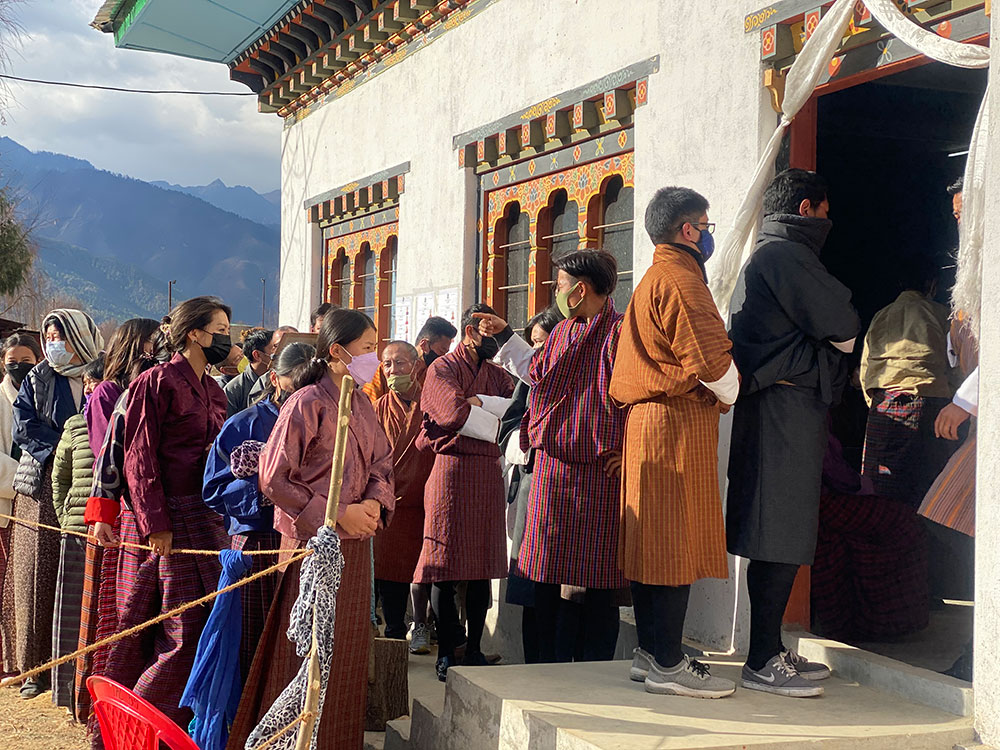The dzongkhag elects two female gups
Phub Dem | Paro
Paro elected its first women gups from Hungrel and Shaba gewogs on December 22.
The dzongkhag had only had women represent them as mangmi, tshogpas, and a throm representative until now.
In the 2016 LG election, Paro had three female candidates contesting for the post of gup, but none was elected.
A former mangmi, Sherab Lham, was one of the first-ever female gups elected. The provisional results show that she won the election by securing 266 votes against her lone opponent, who secured 189 votes.
Sherab Lham, 40, from Hungrel, said that she was delighted with the election result. “She was sceptical, as voters initially shared concerns about women gup candidates.”
While voters agreed that she was experienced and capable, she said some people misled the voters by convincing them that women cannot become gup in Hungrel, as the gup has to lead some traditional practices.
She said her win in the election would encourage other women to take the opportunity.
Sherab Lham said that people were supportive when women contested for the post of tshogpa, but the same people were doubtful about women serving in the gup’s position. “They are doubtful if women can become a gup.”
She said she will have more significant responsibilities in fulfilling her pledges and bringing developmental activities to the area so that people can trust and support other women and provide them with opportunities. “I have served as a tshogpa and mangmi. I have to set an ideal example as a woman gup.”
Shaba gewog also elected Sangay Lhamo as the gup. She won by 643 votes against two other contestants.
She served as tshogpa during the first LG and contested for the gup post in 2016.
Having participated in elections since the first LG election, she said she was surprised to win against a former gup and mangmi.
She said many in the locality still doubt if women are capable of being a gup.
She said that she was committed to inclusive developmental activities.
Paro town residents also re-elected throm thuemi, Deki Lham, with 95 ‘yes’ votes and 11 ‘no’ votes.
Three female candidates contested for the gup positions, three for mangmi, 29 for tshogpa, and one for thromde ngotshab (representative).
During the third local government (LG) election, Parops supported experienced candidates over new ones. Five former mangmi, two gups, and a former tshogpa were re-elected as gup.
Three former gups of Dopshari, Lungyni, and Lamgong were re-elected with 829, 551, and 817 votes, respectively. Former mangmi of Hungrel, Doteng, Tsento, Dogar and Naja were elected as gup this time.
The former mangmi from Doteng, Chimi Dorji, was elected as gup.
He said that voters had chosen experienced candidates over qualifications, adding that people prefer someone who understands the functioning of the gewog office. “They think that new contestants will spend half of their terms understanding their role and responsibilities.”
Applauding the selection of two female gup, he said that it was timely for Paro to have diversity and women’s voices during discussion and decision making.
Paro had 170 candidates contesting in the third LG election. The dzongkhag had 33 candidates vying for the gup’s post and 34 for the mangmi’s position in 10 gewogs.
There were 102 tshogpa candidates from 47 chiwogs. Each chiwog from Lungyni, Shaba, and Dop-Shari were without a tshogpa candidate after the candidates withdrew voluntarily or were disqualified due to party affiliation.
Meanwhile, Tashi Pem, from Nemjo, who came to vote, said that people were well informed about the importance of local government elections and were eagerly engaged in voting for the best candidate.
She said that it has become essential to vote for the competent and vocal candidate over neighbours and relatives, adding that one wrong choice could hamper the developmental activities of chiwogs and gewog for five years.
She added that locals were rooting for candidates who could bring in a proper irrigation canal, road, and stable water connection.


